County Jail
Dennis Rader was taken to an interrogation room after his arrest on February 25, 2005.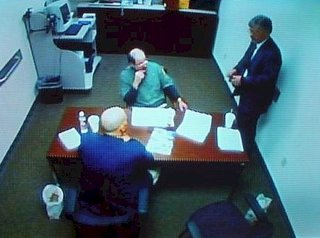 At first he wouldn't talk much about the crimes, playing dumb or avoiding the subject. When he was confronted about the traced computer disk and the DNA match, he started to talk. In fact, he wouldn't stop talking. In a stunning 30 hour confession, he rambled on endlessly about his crimes, as though proudly reciting his achievements. Never-before-known details of all his crimes, his methods, his mind all came to light. Many excerpts of what he said in that interview can be read in the 92 page pdf document State's Summary of the Evidence.
At first he wouldn't talk much about the crimes, playing dumb or avoiding the subject. When he was confronted about the traced computer disk and the DNA match, he started to talk. In fact, he wouldn't stop talking. In a stunning 30 hour confession, he rambled on endlessly about his crimes, as though proudly reciting his achievements. Never-before-known details of all his crimes, his methods, his mind all came to light. Many excerpts of what he said in that interview can be read in the 92 page pdf document State's Summary of the Evidence.
On the 26th of February, Rader's first mugshot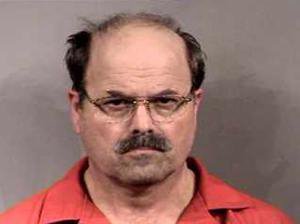 was taken. He looks unkempt, which was out of character for Rader, but had been up all night confessing. When it was all over, though, he was taken to his cell and left there alone. There he began to realize that the cops were not on his side after all. His interrogators had been feeding his ego all along, pretending to be impressed by Rader to get him to keep talking. He bought the whole package. Rader was astonished during the interview when he found out the detectives had lied to him about it being safe to send in a computer disk. He lamented how he thought they had such a good rapport. Lt. Landwehr had to calmly explain that they were trying to catch a serial killer. Rader had always had a strong need to feel accepted by police on a personal level. He thrived on the camaraderie displayed by the detectives, but after it was all over his elation turned to despair. The next interviews were with lawyers, and they caused him to stop the confessing.
was taken. He looks unkempt, which was out of character for Rader, but had been up all night confessing. When it was all over, though, he was taken to his cell and left there alone. There he began to realize that the cops were not on his side after all. His interrogators had been feeding his ego all along, pretending to be impressed by Rader to get him to keep talking. He bought the whole package. Rader was astonished during the interview when he found out the detectives had lied to him about it being safe to send in a computer disk. He lamented how he thought they had such a good rapport. Lt. Landwehr had to calmly explain that they were trying to catch a serial killer. Rader had always had a strong need to feel accepted by police on a personal level. He thrived on the camaraderie displayed by the detectives, but after it was all over his elation turned to despair. The next interviews were with lawyers, and they caused him to stop the confessing.
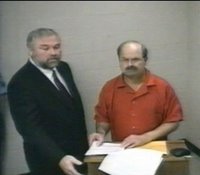 On March 1, the public got their first live look at the newly incarcerated BTK suspect as he appeared briefly via video link to be informed by Judge Greg Waller of the charges against him. Word of his confessions had sporadically leaked out into the media, and police chief Norman Williams took unusually strong action to plug the leaks, denying everything that was going around in the media and threatening to imprison police personnel who were talking openly about the case. In America you are presumed innocent unless you declare your guilt in a court of law. Rader had ceased confessing and became tight-lipped about what he might have done. But the District Attorney's office did state that Dennis Rader was being charged with 10 counts of first degree murder, adding the names Marine Hedge and Dolores Davis to the known list of BTK victims. Rader's house and office had been raided, and plenty of incriminating evidence had been found to back up the 10 counts. It came to light later that the "mother lode" was located in Rader's filing cabinet in his office in city hall in Park City. Original copies of BTK letters, victim driver's licenses, photos, newspaper clippings, artwork and more were all found locked in his office.
On March 1, the public got their first live look at the newly incarcerated BTK suspect as he appeared briefly via video link to be informed by Judge Greg Waller of the charges against him. Word of his confessions had sporadically leaked out into the media, and police chief Norman Williams took unusually strong action to plug the leaks, denying everything that was going around in the media and threatening to imprison police personnel who were talking openly about the case. In America you are presumed innocent unless you declare your guilt in a court of law. Rader had ceased confessing and became tight-lipped about what he might have done. But the District Attorney's office did state that Dennis Rader was being charged with 10 counts of first degree murder, adding the names Marine Hedge and Dolores Davis to the known list of BTK victims. Rader's house and office had been raided, and plenty of incriminating evidence had been found to back up the 10 counts. It came to light later that the "mother lode" was located in Rader's filing cabinet in his office in city hall in Park City. Original copies of BTK letters, victim driver's licenses, photos, newspaper clippings, artwork and more were all found locked in his office.
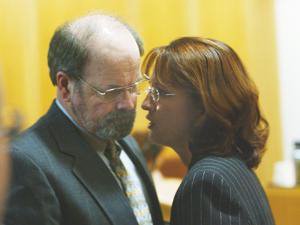 Meanwhile a barrage of information about Dennis Rader was tossed about by the news media. Not one person who had ever known him had ever suspected he was or even could be BTK. No one had turned him in during the intense 11 month investigation that followed BTK's initial reemergence in March 2004. There were people like Mary Capps who thought he was a jerk, but he just didn't come across to anyone as a vicious serial killer. Rader's wife and children were described as being in a deep state of shock. A
Meanwhile a barrage of information about Dennis Rader was tossed about by the news media. Not one person who had ever known him had ever suspected he was or even could be BTK. No one had turned him in during the intense 11 month investigation that followed BTK's initial reemergence in March 2004. There were people like Mary Capps who thought he was a jerk, but he just didn't come across to anyone as a vicious serial killer. Rader's wife and children were described as being in a deep state of shock. A  procession of neighbors and friends all testified to the media that they never would have guessed Rader was capable of the crimes he was being charged with. The congregation of Christ Lutheran Church, led by pastor Michael Clark, was left stunned, confused and bewildered.
procession of neighbors and friends all testified to the media that they never would have guessed Rader was capable of the crimes he was being charged with. The congregation of Christ Lutheran Church, led by pastor Michael Clark, was left stunned, confused and bewildered.
 In March 2005 the long-awaited book by Robert Beattie was released, "Nightmare in Wichita - the Hunt for the BTK Strangler". BTK's reemergence and subsequent arrest delayed the release till this time. Beattie is credited as being a major player in the process that culminated in Dennis Rader's arrest.
In March 2005 the long-awaited book by Robert Beattie was released, "Nightmare in Wichita - the Hunt for the BTK Strangler". BTK's reemergence and subsequent arrest delayed the release till this time. Beattie is credited as being a major player in the process that culminated in Dennis Rader's arrest.
Rader's first court appearance occurred on April 19, 2005. He waived his right to a preliminary hearing and postponed entering a plea, a move that disappointed many who wanted to hear the state's case against him. Judge Waller continued the hearing until May 3, at which time Rader remained mute in front of a crowded and tense courtroom while Waller entered a plea of not guilty. During the hearing he was, however, confronted by District Attorney Nola Foulston who notified him that he was being charged under the Kansas "hard 40" law for the 1991 murder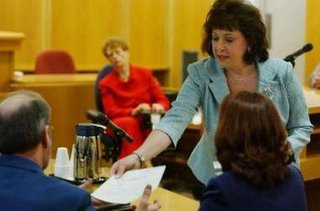 of Dolores Davis, the only murder to occur after that sentencing law went into effect in 1990. That law required a minimum prison sentence of 40 years for any murder considered particularly cruel or heinous. The other nine murders occurred in years in Kansas where the minimum sentence was 15 years. The death penalty did not resume in Kansas until 1994.
of Dolores Davis, the only murder to occur after that sentencing law went into effect in 1990. That law required a minimum prison sentence of 40 years for any murder considered particularly cruel or heinous. The other nine murders occurred in years in Kansas where the minimum sentence was 15 years. The death penalty did not resume in Kansas until 1994.
Rader was initially kept alone and separate in the Sedgwick County Jail, only seen by his three court-appointed lawyers, his pastor and whoever else he permitted to visit him. His wife and chidren refused to visit. There were some letters exchanged. However, Rader soon developed a number of penpals scattered in various locations. He wrote poetry, including an incriminating poem called Black Friday which appeared to describe his arrest while acknowledging his dark side. In a surprise move, county jail officials decided to allow Rader live in a pod where he could mingle with other hardened criminals during the daytime. He was an instant hit with his podmates, who called him "Radar" or "The Suspect". He would chat about sports, religion, crime or anything else and play cards. He soon earned the title "the Podfather".
 Dennis Rader's trial on the 10 counts of first degree murder was set for June 27, 2005. As the date approached with no news of a postponement, speculation erupted about what Rader was up to. It became apparent that he would use that appearance to formally plead guilty, and he did so. The event turned into a dramatic courtroom confession, as Judge Waller began to quiz Rader over some of the details of the crimes. Before millions of viewers watching live coverage on Kansas local stations, on Court TV nationally and worldwide on the Internet, Rader calmly revealed some of the grisly details of his murders from his own perspective, talking about strangulations, hit kits, ruses, projects, etc. as if they were all an everyday thing.
Dennis Rader's trial on the 10 counts of first degree murder was set for June 27, 2005. As the date approached with no news of a postponement, speculation erupted about what Rader was up to. It became apparent that he would use that appearance to formally plead guilty, and he did so. The event turned into a dramatic courtroom confession, as Judge Waller began to quiz Rader over some of the details of the crimes. Before millions of viewers watching live coverage on Kansas local stations, on Court TV nationally and worldwide on the Internet, Rader calmly revealed some of the grisly details of his murders from his own perspective, talking about strangulations, hit kits, ruses, projects, etc. as if they were all an everyday thing.
There was considerable fallout following the confession. One by one, each of the victims' families filed lawsuits against Rader seeking damages. There was little hope of recovering any monetary damages from him, but the idea was to prevent Rader from profiting from his crimes in any way, such as by selling book or TV rights to his story. On July 26, 2005 his wife Paula filed for an emergency divorce citing physical and mental distress, and was immediately granted the divorce. Rader had agreed to give up ownership rights on the small house he shared with his wife as well as all other belongings the couple owned. She could benefit from two pension funds Dennis had established. Soon after the divorce was granted, the family home at 6220 Independence Street in Park City went up for auction. Appraised at $57,000, a benevolent bidder offered $90,000. However the house sale fell through over legal issues. Some of the victims' families ob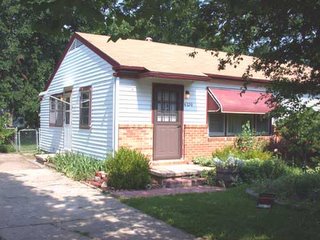 jected to the inflated selling price, calling it "blood money" due to the notoriety of BTK. They demanded in court that the excess, about $30,000, belonged to them and not to Paula. The bidder refused unless the full price went to Paula and later backed out of the deal.
jected to the inflated selling price, calling it "blood money" due to the notoriety of BTK. They demanded in court that the excess, about $30,000, belonged to them and not to Paula. The bidder refused unless the full price went to Paula and later backed out of the deal.
Up to this point prosecutors still had not had the opportunity to formally present their case against Dennis Rader. Rader's own admissions in court were graphic, but diluted with claims of having attempted to comfort victims before their deaths, instead of the outright acts of torture that they were. At the sentencing hearing on August 17 and 18, 2005, prosecutors finally had their turn to present some of the accumulated evidence against Rader in open court. As there was the possibility of leniency since the sentence had to be determined by the judge, the presentation was designed to show why Rader should be sentenced to the maximum permitted by law, which amounted to a minimum of 175 years to life in prison. Rader was now 60 years old and it was desired that he never be eligible to walk the streets of freedom again.
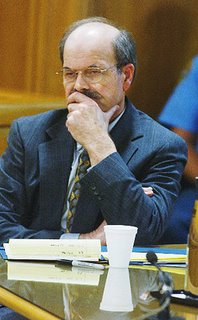 Judge Greg Waller listened patiently to two full days of testimony. Individual detectives representing the cases of the Oteros, Kathryn Bright, Shirley Vian, Nancy Fox, Marine Hedge, Vicki Wegerle and Dolores Davis all gave statements illustrated with grim crime scene and autopsy photos in front of a packed courtroom and another large international television audience. Written transcripts can be seen at The BTK Site under Sentencing Transcripts.
Judge Greg Waller listened patiently to two full days of testimony. Individual detectives representing the cases of the Oteros, Kathryn Bright, Shirley Vian, Nancy Fox, Marine Hedge, Vicki Wegerle and Dolores Davis all gave statements illustrated with grim crime scene and autopsy photos in front of a packed courtroom and another large international television audience. Written transcripts can be seen at The BTK Site under Sentencing Transcripts.
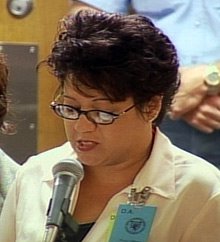 After testimony was completed, individual members of the victims' families were permitted to air their grievances to Rader in court. Moving statements were given from Carmen Montoya (Otero) and Charlie Otero, Kevin Bright, Steve Relford and Richard Vian, Fred Fox the brother of Nancy Fox and her sister Beverley Plapp, Rod Hook the son-in-law of Marine Hedge, Bill Wegerle and daughter Stephanie, and from Jeff Davis the son of Dolores Davis and Davis' daughter Laurel Keating.
After testimony was completed, individual members of the victims' families were permitted to air their grievances to Rader in court. Moving statements were given from Carmen Montoya (Otero) and Charlie Otero, Kevin Bright, Steve Relford and Richard Vian, Fred Fox the brother of Nancy Fox and her sister Beverley Plapp, Rod Hook the son-in-law of Marine Hedge, Bill Wegerle and daughter Stephanie, and from Jeff Davis the son of Dolores Davis and Davis' daughter Laurel Keating.
 After this Rader was permitted to give his own statement. He rambled on for over 20 minutes, delivering a semi-apology to everyone and going on mostly about himself. It took on the air of someone giving a speech to a church group, thanking all the people who had helped him recently.
After this Rader was permitted to give his own statement. He rambled on for over 20 minutes, delivering a semi-apology to everyone and going on mostly about himself. It took on the air of someone giving a speech to a church group, thanking all the people who had helped him recently.
 At the end of the proceeding on August 18 Judge Waller sentenced Dennis Rader to the maximum sentence permitted by law, a minimum of 175 years to life in prison. He will not be eligible for parole until 2180. Sedgwick County District Attorney Nola Foulston requested special conditions for Rader's sentence, stating that he should be denied access to materials that could feed his fantasies.
At the end of the proceeding on August 18 Judge Waller sentenced Dennis Rader to the maximum sentence permitted by law, a minimum of 175 years to life in prison. He will not be eligible for parole until 2180. Sedgwick County District Attorney Nola Foulston requested special conditions for Rader's sentence, stating that he should be denied access to materials that could feed his fantasies.
Next: The Big House
 At first he wouldn't talk much about the crimes, playing dumb or avoiding the subject. When he was confronted about the traced computer disk and the DNA match, he started to talk. In fact, he wouldn't stop talking. In a stunning 30 hour confession, he rambled on endlessly about his crimes, as though proudly reciting his achievements. Never-before-known details of all his crimes, his methods, his mind all came to light. Many excerpts of what he said in that interview can be read in the 92 page pdf document State's Summary of the Evidence.
At first he wouldn't talk much about the crimes, playing dumb or avoiding the subject. When he was confronted about the traced computer disk and the DNA match, he started to talk. In fact, he wouldn't stop talking. In a stunning 30 hour confession, he rambled on endlessly about his crimes, as though proudly reciting his achievements. Never-before-known details of all his crimes, his methods, his mind all came to light. Many excerpts of what he said in that interview can be read in the 92 page pdf document State's Summary of the Evidence.On the 26th of February, Rader's first mugshot
 was taken. He looks unkempt, which was out of character for Rader, but had been up all night confessing. When it was all over, though, he was taken to his cell and left there alone. There he began to realize that the cops were not on his side after all. His interrogators had been feeding his ego all along, pretending to be impressed by Rader to get him to keep talking. He bought the whole package. Rader was astonished during the interview when he found out the detectives had lied to him about it being safe to send in a computer disk. He lamented how he thought they had such a good rapport. Lt. Landwehr had to calmly explain that they were trying to catch a serial killer. Rader had always had a strong need to feel accepted by police on a personal level. He thrived on the camaraderie displayed by the detectives, but after it was all over his elation turned to despair. The next interviews were with lawyers, and they caused him to stop the confessing.
was taken. He looks unkempt, which was out of character for Rader, but had been up all night confessing. When it was all over, though, he was taken to his cell and left there alone. There he began to realize that the cops were not on his side after all. His interrogators had been feeding his ego all along, pretending to be impressed by Rader to get him to keep talking. He bought the whole package. Rader was astonished during the interview when he found out the detectives had lied to him about it being safe to send in a computer disk. He lamented how he thought they had such a good rapport. Lt. Landwehr had to calmly explain that they were trying to catch a serial killer. Rader had always had a strong need to feel accepted by police on a personal level. He thrived on the camaraderie displayed by the detectives, but after it was all over his elation turned to despair. The next interviews were with lawyers, and they caused him to stop the confessing. On March 1, the public got their first live look at the newly incarcerated BTK suspect as he appeared briefly via video link to be informed by Judge Greg Waller of the charges against him. Word of his confessions had sporadically leaked out into the media, and police chief Norman Williams took unusually strong action to plug the leaks, denying everything that was going around in the media and threatening to imprison police personnel who were talking openly about the case. In America you are presumed innocent unless you declare your guilt in a court of law. Rader had ceased confessing and became tight-lipped about what he might have done. But the District Attorney's office did state that Dennis Rader was being charged with 10 counts of first degree murder, adding the names Marine Hedge and Dolores Davis to the known list of BTK victims. Rader's house and office had been raided, and plenty of incriminating evidence had been found to back up the 10 counts. It came to light later that the "mother lode" was located in Rader's filing cabinet in his office in city hall in Park City. Original copies of BTK letters, victim driver's licenses, photos, newspaper clippings, artwork and more were all found locked in his office.
On March 1, the public got their first live look at the newly incarcerated BTK suspect as he appeared briefly via video link to be informed by Judge Greg Waller of the charges against him. Word of his confessions had sporadically leaked out into the media, and police chief Norman Williams took unusually strong action to plug the leaks, denying everything that was going around in the media and threatening to imprison police personnel who were talking openly about the case. In America you are presumed innocent unless you declare your guilt in a court of law. Rader had ceased confessing and became tight-lipped about what he might have done. But the District Attorney's office did state that Dennis Rader was being charged with 10 counts of first degree murder, adding the names Marine Hedge and Dolores Davis to the known list of BTK victims. Rader's house and office had been raided, and plenty of incriminating evidence had been found to back up the 10 counts. It came to light later that the "mother lode" was located in Rader's filing cabinet in his office in city hall in Park City. Original copies of BTK letters, victim driver's licenses, photos, newspaper clippings, artwork and more were all found locked in his office. Meanwhile a barrage of information about Dennis Rader was tossed about by the news media. Not one person who had ever known him had ever suspected he was or even could be BTK. No one had turned him in during the intense 11 month investigation that followed BTK's initial reemergence in March 2004. There were people like Mary Capps who thought he was a jerk, but he just didn't come across to anyone as a vicious serial killer. Rader's wife and children were described as being in a deep state of shock. A
Meanwhile a barrage of information about Dennis Rader was tossed about by the news media. Not one person who had ever known him had ever suspected he was or even could be BTK. No one had turned him in during the intense 11 month investigation that followed BTK's initial reemergence in March 2004. There were people like Mary Capps who thought he was a jerk, but he just didn't come across to anyone as a vicious serial killer. Rader's wife and children were described as being in a deep state of shock. A  procession of neighbors and friends all testified to the media that they never would have guessed Rader was capable of the crimes he was being charged with. The congregation of Christ Lutheran Church, led by pastor Michael Clark, was left stunned, confused and bewildered.
procession of neighbors and friends all testified to the media that they never would have guessed Rader was capable of the crimes he was being charged with. The congregation of Christ Lutheran Church, led by pastor Michael Clark, was left stunned, confused and bewildered.Rader's first court appearance occurred on April 19, 2005. He waived his right to a preliminary hearing and postponed entering a plea, a move that disappointed many who wanted to hear the state's case against him. Judge Waller continued the hearing until May 3, at which time Rader remained mute in front of a crowded and tense courtroom while Waller entered a plea of not guilty. During the hearing he was, however, confronted by District Attorney Nola Foulston who notified him that he was being charged under the Kansas "hard 40" law for the 1991 murder
 of Dolores Davis, the only murder to occur after that sentencing law went into effect in 1990. That law required a minimum prison sentence of 40 years for any murder considered particularly cruel or heinous. The other nine murders occurred in years in Kansas where the minimum sentence was 15 years. The death penalty did not resume in Kansas until 1994.
of Dolores Davis, the only murder to occur after that sentencing law went into effect in 1990. That law required a minimum prison sentence of 40 years for any murder considered particularly cruel or heinous. The other nine murders occurred in years in Kansas where the minimum sentence was 15 years. The death penalty did not resume in Kansas until 1994.Rader was initially kept alone and separate in the Sedgwick County Jail, only seen by his three court-appointed lawyers, his pastor and whoever else he permitted to visit him. His wife and chidren refused to visit. There were some letters exchanged. However, Rader soon developed a number of penpals scattered in various locations. He wrote poetry, including an incriminating poem called Black Friday which appeared to describe his arrest while acknowledging his dark side. In a surprise move, county jail officials decided to allow Rader live in a pod where he could mingle with other hardened criminals during the daytime. He was an instant hit with his podmates, who called him "Radar" or "The Suspect". He would chat about sports, religion, crime or anything else and play cards. He soon earned the title "the Podfather".
 Dennis Rader's trial on the 10 counts of first degree murder was set for June 27, 2005. As the date approached with no news of a postponement, speculation erupted about what Rader was up to. It became apparent that he would use that appearance to formally plead guilty, and he did so. The event turned into a dramatic courtroom confession, as Judge Waller began to quiz Rader over some of the details of the crimes. Before millions of viewers watching live coverage on Kansas local stations, on Court TV nationally and worldwide on the Internet, Rader calmly revealed some of the grisly details of his murders from his own perspective, talking about strangulations, hit kits, ruses, projects, etc. as if they were all an everyday thing.
Dennis Rader's trial on the 10 counts of first degree murder was set for June 27, 2005. As the date approached with no news of a postponement, speculation erupted about what Rader was up to. It became apparent that he would use that appearance to formally plead guilty, and he did so. The event turned into a dramatic courtroom confession, as Judge Waller began to quiz Rader over some of the details of the crimes. Before millions of viewers watching live coverage on Kansas local stations, on Court TV nationally and worldwide on the Internet, Rader calmly revealed some of the grisly details of his murders from his own perspective, talking about strangulations, hit kits, ruses, projects, etc. as if they were all an everyday thing.There was considerable fallout following the confession. One by one, each of the victims' families filed lawsuits against Rader seeking damages. There was little hope of recovering any monetary damages from him, but the idea was to prevent Rader from profiting from his crimes in any way, such as by selling book or TV rights to his story. On July 26, 2005 his wife Paula filed for an emergency divorce citing physical and mental distress, and was immediately granted the divorce. Rader had agreed to give up ownership rights on the small house he shared with his wife as well as all other belongings the couple owned. She could benefit from two pension funds Dennis had established. Soon after the divorce was granted, the family home at 6220 Independence Street in Park City went up for auction. Appraised at $57,000, a benevolent bidder offered $90,000. However the house sale fell through over legal issues. Some of the victims' families ob
 jected to the inflated selling price, calling it "blood money" due to the notoriety of BTK. They demanded in court that the excess, about $30,000, belonged to them and not to Paula. The bidder refused unless the full price went to Paula and later backed out of the deal.
jected to the inflated selling price, calling it "blood money" due to the notoriety of BTK. They demanded in court that the excess, about $30,000, belonged to them and not to Paula. The bidder refused unless the full price went to Paula and later backed out of the deal.Up to this point prosecutors still had not had the opportunity to formally present their case against Dennis Rader. Rader's own admissions in court were graphic, but diluted with claims of having attempted to comfort victims before their deaths, instead of the outright acts of torture that they were. At the sentencing hearing on August 17 and 18, 2005, prosecutors finally had their turn to present some of the accumulated evidence against Rader in open court. As there was the possibility of leniency since the sentence had to be determined by the judge, the presentation was designed to show why Rader should be sentenced to the maximum permitted by law, which amounted to a minimum of 175 years to life in prison. Rader was now 60 years old and it was desired that he never be eligible to walk the streets of freedom again.
 Judge Greg Waller listened patiently to two full days of testimony. Individual detectives representing the cases of the Oteros, Kathryn Bright, Shirley Vian, Nancy Fox, Marine Hedge, Vicki Wegerle and Dolores Davis all gave statements illustrated with grim crime scene and autopsy photos in front of a packed courtroom and another large international television audience. Written transcripts can be seen at The BTK Site under Sentencing Transcripts.
Judge Greg Waller listened patiently to two full days of testimony. Individual detectives representing the cases of the Oteros, Kathryn Bright, Shirley Vian, Nancy Fox, Marine Hedge, Vicki Wegerle and Dolores Davis all gave statements illustrated with grim crime scene and autopsy photos in front of a packed courtroom and another large international television audience. Written transcripts can be seen at The BTK Site under Sentencing Transcripts. After testimony was completed, individual members of the victims' families were permitted to air their grievances to Rader in court. Moving statements were given from Carmen Montoya (Otero) and Charlie Otero, Kevin Bright, Steve Relford and Richard Vian, Fred Fox the brother of Nancy Fox and her sister Beverley Plapp, Rod Hook the son-in-law of Marine Hedge, Bill Wegerle and daughter Stephanie, and from Jeff Davis the son of Dolores Davis and Davis' daughter Laurel Keating.
After testimony was completed, individual members of the victims' families were permitted to air their grievances to Rader in court. Moving statements were given from Carmen Montoya (Otero) and Charlie Otero, Kevin Bright, Steve Relford and Richard Vian, Fred Fox the brother of Nancy Fox and her sister Beverley Plapp, Rod Hook the son-in-law of Marine Hedge, Bill Wegerle and daughter Stephanie, and from Jeff Davis the son of Dolores Davis and Davis' daughter Laurel Keating. After this Rader was permitted to give his own statement. He rambled on for over 20 minutes, delivering a semi-apology to everyone and going on mostly about himself. It took on the air of someone giving a speech to a church group, thanking all the people who had helped him recently.
After this Rader was permitted to give his own statement. He rambled on for over 20 minutes, delivering a semi-apology to everyone and going on mostly about himself. It took on the air of someone giving a speech to a church group, thanking all the people who had helped him recently. At the end of the proceeding on August 18 Judge Waller sentenced Dennis Rader to the maximum sentence permitted by law, a minimum of 175 years to life in prison. He will not be eligible for parole until 2180. Sedgwick County District Attorney Nola Foulston requested special conditions for Rader's sentence, stating that he should be denied access to materials that could feed his fantasies.
At the end of the proceeding on August 18 Judge Waller sentenced Dennis Rader to the maximum sentence permitted by law, a minimum of 175 years to life in prison. He will not be eligible for parole until 2180. Sedgwick County District Attorney Nola Foulston requested special conditions for Rader's sentence, stating that he should be denied access to materials that could feed his fantasies.Next: The Big House

<< Back to Chapter 1